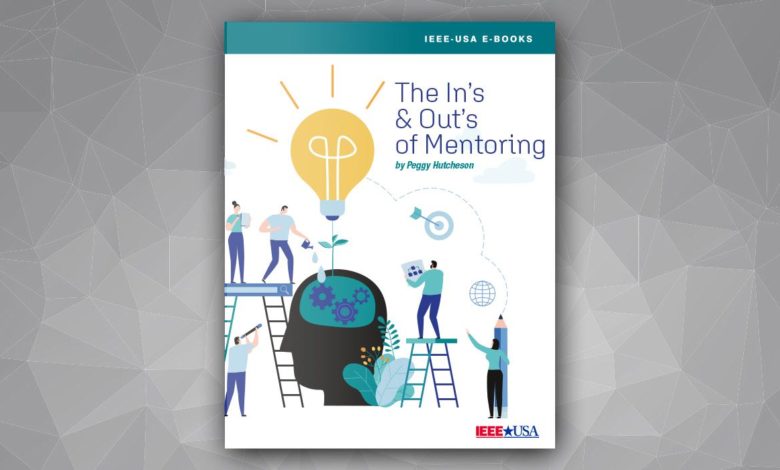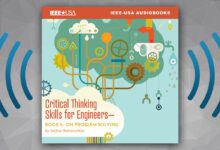
The physicist and 2015 IEEE Medal of Honor recipient Mildred Dresselhaus once described mentoring as “Listening to people, helping them go over the issues, and clarifying how to deal with any problems that might arise.”
In a nutshell, that’s the role of a mentor. But if you’ve ever needed professional guidance or advice — or you’ve wanted to provide this to someone else — a useful new e-book from IEEE-USA provides important strategies to help make the mentor-mentee partnership a success.
In The In’s and Out’s of Mentoring, author Peggy Hutcheson draws on her expertise in organization and career development to define not only the different types of mentoring, but also how to both find a mentor, or become one. IEEE-USA is introducing the volume this month via the IEEE-USA Shop for $1.99 for members and $3.99 for non-members.
The author points out that while there’s no universally accepted definition of mentoring, it’s an ancient concept that can be traced back to Greek mythology. When Odysseus left home to fight in the Trojan War, he left Mentor to be the teacher, trusted advisor and protector to Telemachus, Odysseus’ son.
“Today, anyone who has responsibility for helping someone else’s development, especially in the area of career development, may be called a mentor,” writes Hutcheson. “The mentor is anyone who is willing to use his or her wisdom, experience, or expertise to help someone else develop.”
She says that while the Mentor and Telemachus relationship lasted for many years, today a mentoring connection may be short- or long-term. Sometimes, they are for designated periods, such as one or two years in formal, corporate mentoring programs. Other times, however, they are less formal — and are based on lasting only until the person being mentored reaches a specific goal. Other times, the mentoring relationship can evolve into a lifelong friendship.
Is there a difference between mentoring and coaching? The author doesn’t believe the two words are always interchangeable. She says that coaching is about a specific situation that needs attention, or a skill that needs to be developed.
“Mentoring,” she emphasizes, “is more growth oriented — more about helping the whole person develop — to make the most of their opportunities and meet their goals.”
She adds that one size does not fit all in mentoring. “You may think of a mentor as a more senior leader, someone who has some special talents or experience that you want to lean from, or someone you believe can open doors for you. In fact, in today’s fast-moving world, it’s not unusual for someone to have more than one mentor to help fill more than one need,” says the author.
Hutcheson aims an important chapter of her e-book at individuals who are seeking mentors, and offers many suggestions on finding a good match.
For starters, she says that mentors most often are people who are already part of your life. A professor who was helpful while you were in school may well be willing to talk with you about an issue for which you want help. In addition, alumni events tend to draw successful professionals who can be strong, enthusiastic mentors. In this case, supporting the same university, and having some other similar interests, can go a long way toward cementing an effective mentoring relationship.
The author notes that other possible mentors may already be part of your life. Friends or family members may be able to recognize elements that are holding you back. At work, someone leading a project — or in another department that you want to know more about — can become a mentor.
Professional organizations like IEEE offer a multitude of opportunities to find a potential mentor. Recalling her own early career experiences, Hutcheson advises joining and volunteering for a variety of committees and assignments.
“For me,” she writes, “volunteering led to both short-term mentoring, such as learning from the treasurer how to keep good financial records and budgets;, to longer-lasting relationships, ones that provided access to work opportunities and skills development.”
The author has several warnings for those professionals who may be asked, or are interested, in becoming a mentor.
“Consider what it takes to be a mentor,” she says. “Mentoring someone is an investment of your time and talent.” She notes the mentor must also possess “conscious competence” — that is, an awareness of his or her own strengths.
A few other qualities that effective mentors should have include a sincere desire to help the other person learn and develop, and the ability to provide honest, non-judgmental feedback. Hutcheson provides further details on these and other necessary mentoring traits in her e-book.
As for the author’s own experiences with mentors, she says she has benefited from several mentors in her life. “Some,” she reflects, “knew that they were mentoring me. Other times, I was learning new skills or behaviors from someone, without ever declaring the relationship was mentoring.”
In more than 25-years of work in career development, Peggy Hutcheson, Ph.D., has served both large corporations and small businesses. She is the founding partner of the Odyssey Group, which specializes in products and services for organizations and individuals to connect people to changing work roles. She is past chair of IEEE-USA’s Employment and Career Services Committee, and currently serves on it, as well as the IEEE-USA Communications Committee. Hutcheson completed her undergraduate studies at the University of Georgia. Her Ph.D. from Georgia State University focused on organizational career development.






